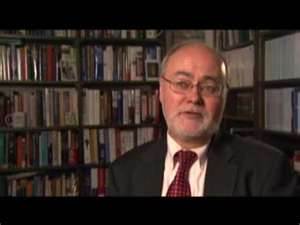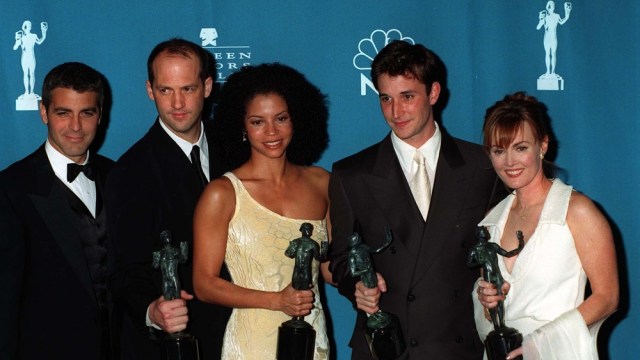Darwin vs. Christianity and Transhumanism?

So my class on technology is beginning to consider skeptical views of the transformative possibilities of biotechnology. One comes from those who say that the evolutionary understanding of nature explains everything about who we are.
Maybe the most intelligent and certainly the most erudite defender of the “Darwin explains it all” proposition is Larry Arnhart. (Check out his amazingly comprehensive and thoughtful blog.) Larry calls himself a Darwinian conservative. For one thing, Larry puts himself more in the “generationist” than the “innovationist” camp. He says that social desires have been given to us social animals by nature. And we’re happy when we act according to those desires. So we deny who we are when we innovate in such a way as to undermine who we are as generative animals, which we are no less than the other mammals. Transhumanism, for Larry, is both undesirable and impossible.
Larry is fond of saying that nature is our home. So all of our experiences of alienation from nature are based on illusions. We aren’t, as existentialist philosophers such as Heidegger seem to say, aliens thrown into this world from God knows where. It’s the techno-project to liberate us from nature that makes us think of ourselves as more homeless than we need be. That techno-project is a secularization of what Larry believes to be the Christian fantasy that to be a person is not to be defined by biological limitations, to be somehow more than a merely natural being. The Christians and the transhumanists both make the mistake of imagining that we truly long to be more than biological beings, that we long for a world where no longer constrained by the natural imperatives of biological birth and biological death.
Heaven is the world Christians believe we will inhabit after natural death as the result of the grace of our personal Creator. There we will somehow remain whole persons with bodies—including our generative equipment—but we will no longer be married or have sexual lives. Because nobody will die, they’ll be no need for birth. And our love will be perfected by being free from the limitations of sinful bodily separateness we now experience. We will see other persons in love just as they are.
Larry, of course, readily finds all kinds of contradictions in that imagined existence. Being whole social animals has to mean being the sexual and generative beings that nature intends us to be. And the idea of “pure love” that somehow transcends altogether the natural imperatives of reproductive coupling and the raising of young is ridiculous. “Personal love” is the attachment of social animals to each other—ultimately in the interest of the biological perpetuation of the species. Just as Larry finds “political life” among the other primates, he would surely find “personal love” among the dolphin. He says that “love of God” has to be explained as a tool for social bonding and nothing more.
The transhumanists, of course, make the mistake of imagining that somehow personal consciousness can be detached from physical embodiment, just as they make the mistake of believing that our erotic desires can remain what they are if detached from generation. There’s no way we could ever become conscious machines or conscious software. And conscious, disembodied existence would, in fact, be detached from the desires that make life desirable. It would be the misery of “pure possibility,” of the empty experience of “not not-being.” The techno-mode of imagining freedom to be freedom from nature ends up with freedom being just another word for nothing left to lose.
From the point of view of Darwinian conservatism, the various techno-visions of heaven on earth that we create through our own efforts are probably more ridiculous than the Christian vision of otherworldly heaven. The first of these visions we find in Marx: We completely conquer nature and so eradicate natural scarcity. God and the state wither away, and we live completely unobsessive lives, doing what we please whenever we please. We will be free from the various forms of necessity that have historically distorted human lives—or kept me from being wholly me. They include natural necessity, the necessity of being a cog in a scheme of division of labor not of my devising, and, apparently, the necessity of love. There are no children in Marx’s vision of communism! (It’s hard to know what’s “communist” or communal about it.) There are no “can’t helps,” beginning with can’t help falling in love. (Marx says, in effect, that capitalism killed love, and what capitalism truthfully kills doesn’t come back.)
Now the easy existentialist criticism of Marx is that even under communism people will continue to die. His vision of the conquest of nature really doesn’t have a biotechnological dimension. How is it possible to be self-conscious and mortal and not somewhat alienated and obsessive? The transhumanists promise to solve that problem by detaching self-consciousness from mortality. The real conquest of nature depends on the biotechnological separation of “the self” from the body. For Larry, the transhumanist correction of Marxism in the name of consistency produces the impossible (thank evolution or nature) hell of a wholly unnatural existence.
So here’s the good news Larry gives us about our biotechnological future: “If we keep in mind the adaptive complexity of human nature, we can foresee that biotechnology will be naturally limited both in its technological means and its moral ends.”
Given that adaptive complexity, “precise technological manipulation of human nature to enhance desirable traits while avoiding undesirable side effects will be very difficult if not impossible.” There may be two pieces of bad news lurking there: We might have to learn some tough lessons about “undesirable side effects.” And “very difficult” isn’t the same thing as “impossible”: Larry isn’t absolutely sure about nature’s capacity to resist our conscious and volitional efforts at manipulation to transform ourselves into more or other than natural beings. He’s not absolutely sure that Darwin explains it all.
Biotechnology, Larry claims, will be morally limited by the fact that “the motivation for biotechnological manipulations will come from the same natural desires that have always characterize human nature.” Technological means will serve natural ends; techno-liberation won’t become an end in itself.
But, as I will explain more later, Larry doesn’t really sell the “natural desire as invincible limitation on human technology” position. He admits, for example, that parents, out of love, might want to free their children from suffering and death. And he doesn’t really give a Darwinian explanation for why only members of our species alone “dream of physical and mental perfection” or what Leon Kass calls “ageless bodies, happy souls.”
About that dream, Larry’s real response is “How likely is that?” His response, in other words, is technical, not moral. And so Larry can’t really explain why we might really screw ourselves up in pursuit of that mission impossible, in, for example, trying and maybe succeeding in clamping down on our “naturally adaptive” emotions such as fear and anxiety. It’s true that “being utterly unresponsive to stress would be unhealthy,” but that doesn’t mean Marx didn’t move lots of us with that dream of overcoming obsession.
The quotations in this post are from Larry’s fine essay “The Bible and Biotechnology” in Biotechnology, ed. S. Sutton (SUNY Press).





